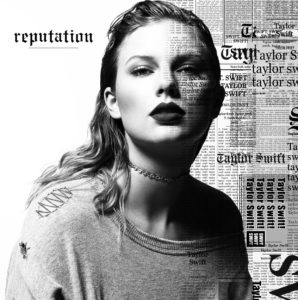Any time Taylor Swift releases a new album, the world watches. Music listeners know that three or four songs from the album will probably be inescapable on the radio for the next year or two, while chart followers observe to see what records Swift could possibly break next. However, things did not quite feel normal a few months ago when “reputation” was announced. The world was introduced to this new Swift era through the blaring “Look What You Made Me Do.” It was clear that Swift’s quirky, teen-friendly personality from “1989” and her previous albums would be gone, or at least would not be present on “reputation.” Other than “Gorgeous,” a funny pop song that sounds like an outtake from “1989,” most of “reputation” contains darker trap-pop that centers around Swift’s fame and persona, and her perspective on having relationships with the pressure of fame.
On “reputation,” Swift is more aware of her stardom than ever before. This is evident both on the album and in her release strategy. For example, her record label negotiated a deal with Target to have her albums be the only ones populating the “Hits” endcap in the CD section of stores nationwide. This makes her popularity seem very forced, and the hype for her album seem invented. On the album, she mentions the idea of having a bad reputation many times, like in “End Game” and “Delicate.” However, this idea seems to come out of nowhere. Additionally, the fact that these two songs come towards the beginning of the album makes the lengthy runtime of the album, nearly an hour, seem much more daunting. The prospect of 55 minutes of fabricated edginess seems more like a chore than a pleasure to listen to. Luckily, the rest of the album deals with different subject matter and has some bright spots. “…Ready For It” sounds like the direction the album should have taken; it is still dark, but contains playful, sarcastic lyrics reminiscent of earlier eras, and it is exciting and experimental with the genres it contains. Likewise, “I Did Something Bad” is an effective foray into EDM-pop, with heavy synths and vocals reminiscent of a Flume song.
Another shift from previous albums is evident in Swift’s lyrics on “reputation.” Songs from the past like “Mean” and “You Belong With Me,” which tell stories while also being catchy, quirky, and relatable, are largely missing on the new album, which instead opts for generic pop lyrics that inspire quick imagery. For example, in two different songs, “Call It What You Want” and “So It Goes…,” Swift sings some variant of wanting to “wear [someone] like a necklace.” In both songs, the overall lyrics feel more disjointed than connected to one another. In fact, most of the album does not seem cohesive. Especially since audiences were introduced to “reputation” through lead single “Look What You Made Me Do,” which is about Swift losing her public image, the song now seems more like a shocking publicity stunt engineered to reintroduce her to the public and cause a social media uproar than an actual song that belongs to the album, because most of the rest of the album does not deal with the same subject matter.
“Reputation” seems disjointed, needlessly intense, and too focused on fame. Music listeners would have been happy with what Swift does best: young-sounding melodies and some of the best pop songwriting in mainstream music. However, she delivered an attempt at a more mature, aware sound, which unfortunately comes across as tired and disconnected from the public. After all, Swift is now 27 years old, so perhaps a change was imminent.

Photo Courtesy of Billboard
Be First to Comment